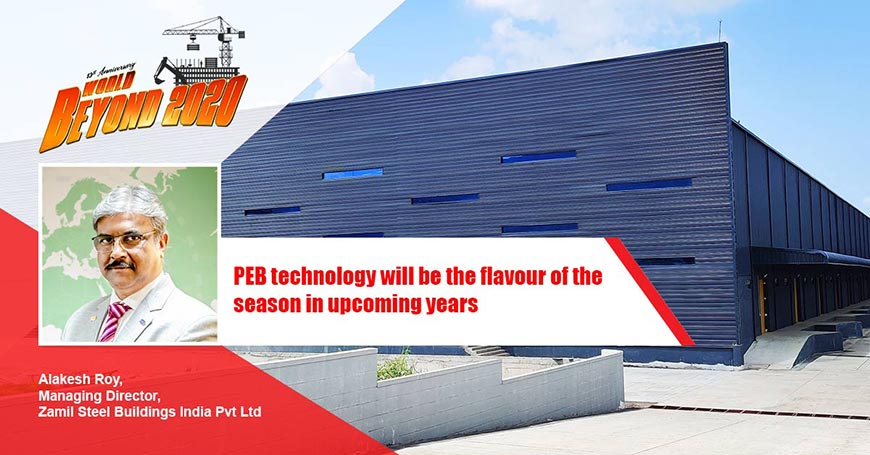PEB technology will be the flavour of the season in upcoming years
Wednesday, 21st October 2020

Irrespective of Covid pandemic, people have always wanted to accelerate the process of construction. The PEB concept is devoid of delays, we are executing a 5,000-7,000 metric ton single project in less than six months says Alakesh Roy.
How do you see Atmanirbhar Bharat to impact your sector?
Atmanirbhar Bharat will accelerate the concept of indigenous manufacturing and production. A lot of things will happen on the technology front too, technology transfer will be quickened and more and more machines will be manufactured in the country itself. The impact of this change will be visible in case of goods like mobile phones which we use on a daily basis. Likewise in case of cars we tend to pay a royalty for certain critical components, such components too will now be manufactured in-house. Talking about the PEB sector, once the manufacturing sector grows, you will see a lot of growth in the requirements of facilities such as industrialisation. And with the defence sector opening up to private players in India, it will also impact our sector in terms of facilities being put up across different locations in India for defence manufacturing.
In terms of current market dynamics, what will be the new normal after 2020?
There is no such thing as post-Covid-19; Covid is here to stay and we have to learn to live with it. Under the new normal, slowly but surely, the on site fabrication for the construction sector will reduce and as a result of this, the manpower usage will reduce and more and more use of automated machinery and factory manufactured products will make inroads into the construction segment. There will be few sectors which will suffer a hit due to coronavirus such as aviation, hospitality, hotels and they will normalize over a period of time.
Due to Covid pandemic, people have started using applications like Microsoft Teams, Zoom and Google Duo for communication and they are at negligible cost, real-time and apart from the personal touch, everything else is in order. Going forward, for the majority of segments, travelling will be necessary only for important things and most meetings will happen on virtual platforms.
What kind of infrastructure upgrade initiatives should the government focus on to ensure the construction sector remains in robust health?
There are certain fundamentals which need to get corrected for the infrastructure sector. These fundamentals are labour reforms, cost of doing business anywhere in India and power tariffs. When you move across the industry, the deterrent for such kinds of movements is whether production units and consumption units are differently located. This was happening due to tax being a major source of discrimination between states. Today with the logistics sector improving like the road and railway transport network, it will be more of a distribution kind of a scenario rather than a manufacturing kind of scenario.
For example, you can manufacture everywhere; distribute the product at the lowest cost and it doesn't require your company to have a pan-India presence. So, the infrastructure upgrade will be of help. The government has taken the right initiative to improve the speed of the rail; transportation of goods via roads will be a welcome break on GST. The travel time from Delhi to Mumbai has been reduced by 40 per cent thereby increasing the throughput time of the transport sector or the commercial sector. The infrastructure upgrade will happen simultaneously with reforms taking place in other segments.
This year paved the way for digitalization like never before, how has it impacted the PEB industry? What will be the role of AI and technology in the development of future PEB assisted infrastructure?
At Zamil Steel, we are fully digitized and there is no movement of paper. Everything is done through a system. Although we are operating on the Oracle 12 platform currently, we will be upgrading our system to Oracle fusion in the future. Other companies in India too have digitized their operations for smooth operations. In the wake of AI and technological finesse, system-oriented automation will lead the way in PEB manufacturing processes and towards Industry 4.0.
On-site innovations will result in use of lesser manpower and require only a crane and formwork to get assembled one after another in a constructive format. So, the days of cutting, welding and lifting a building are over because of space limitation as also the fact that we have more high-rises and lesser manpower.
In the long run, how will the pandemic impact the usage of PEB in the construction and infrastructure sector?
Irrespective of Covid pandemic, people have always wanted to accelerate the process of construction. This is important especially for huge projects be it residential or infrastructure, more so because it directly affects the cost of the project. Unlike earlier, where a project dragged on for 5 to 10 years, people are keen on timely deliveries now. The PEB concept is to devoid of delays, we are executing a 5,000-7,000 metric ton single project in less than six months time. PEB technology will be the flavour of the season in upcoming years.
Could you talk to us about Zamil Steel's operations in India as well as overseas? Our global operations exist in numerous countries across the world, right from Egypt and all the way to Vietnam. Even in the ongoing scenario, we have expanded our capacities and capabilities in Vietnam and India. Because we believe these two economies will grow in short term as well as long term. In Vietnam, we have expanded our capacity by almost 50 per cent. In India, we are augmenting in terms of projects being executed, which also includes high-rise and tubular structures. In the next 12-18 months, we will see a huge surge in demand. Once the consumption picks up and I am optimistic that the economy will gain momentum for most of the sectors.
